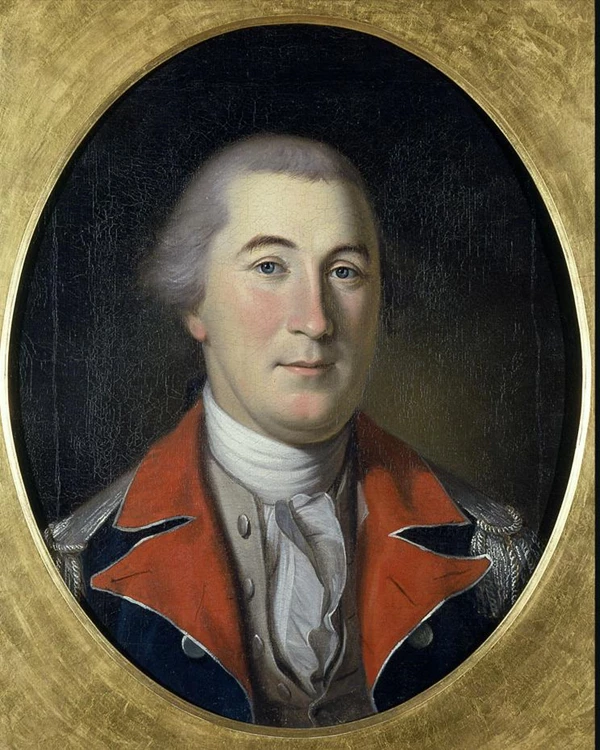Last updated: February 20, 2025
Person
Joseph Reed

Independence NHP Museum Collection (INDE 14118)
Joseph Reed's life was characterized by adventure, duty, and challenges. Seeing early success as a lawyer, Reed became an integral part of the early efforts of the American Revolution as he served as Washington’s secretary and played an active role in military and civil politics.
Born in 1741 in Trenton, New Jersey, Reed was the eldest son in a family that soon moved to Philadelphia. He was bright and ambitious, studying at the Philadelphia Academy and then at the College of New Jersey (now Princeton University). Reed's legal career began in earnest when he studied law under Richard Stockton, a well-respected jurist. Seeking further education, he went to London in 1763, immersing himself in the legal world and falling in love with Esther DeBerdt. However, their marriage had to wait until 1770, as DeBerdt’s parents felt that Reed needed to first establish himself in England.
Back in New Jersey by 1765, Reed’s law practice flourished, earning him £1,000 a year by 1767. Despite this success, Reed felt a strong pull towards public service. He was involved in politics and was even offered a position in the British imperial administration, which he declined.
Reed's life took a dramatic turn in 1775 when, serving as chairman of Philadelphia’s Committee of Sixty-Six, he met George Washington. Impressed by Reed's writing skills and character, Washington chose him as his military secretary during the early American Revolution and Reed joined Washington in Cambridge, Massachusetts. This role was crucial – Reed was responsible for drafting important letters and orders, managing Washington's office, and handling confidential information. It was a job that required trust, intelligence, and a cool head.
Despite earning less as a secretary than as a lawyer, Reed dedicated himself to this role. He took on additional duties as an adjutant general and quartermaster, showing his versatility and commitment. His work with Washington wasn't easy. For instance, Reed knew almost nothing about military affairs and had to quickly learn about the subject by examining military tracts under Washington’s guidance.
Reed's relationship with Washington was unique. They held a deep mutual respect and shared openly about personal subjects; Washington relied heavily on Reed's advice and skills. Indeed, when Reed left to return home to Philadelphia, Washington requested Reed to return in multiple letters, indicating that no other aides could do as well a job as Reed. Washington appreciated Reed for his candor and honesty in pointing out areas of disagreement with his leadership decisions in colonial governance, writing to Reed in January 1776:
I can bear to hear of imputed or real errors. The man who wishes to stand well in the opinion of others must do this; because he is thereby enabled to correct his faults, or remove prejudices which are imbibed against him.
However, this closeness had its challenges. In December 1776, Washington opened a letter from General Charles Lee to Reed, exposing their doubts about his leadership after his defeat in New York City that summer. From this point, Reed and Washington maintained a professional relationship, but they would never share the same trust and mutual dependence.
In addition to his military role, Reed was active in politics. He was elected to the Philadelphia provincial assembly in January of 1776 and argued in favor of declaring independence. His commitment to the public cause was unwavering, even as he juggled his responsibilities in both military and civil spheres. Elected to the Continental Congress in 1777, Reed was among the five Pennsylvania signatories of the Articles of Confederation. The next year, he became president of Pennsylvania's Supreme Executive Council, guiding the enactment of America's initial gradual emancipation law in 1780 and advocating for financial rewards for Pennsylvanian soldiers post-war. Additionally, he collaborated with the Pennsylvania Assembly to prosecute and impose severe penalties on the state’s Loyalists.
Reed's personal life was not without its trials. He had to leave his young family behind when he joined Washington. Despite the challenges, Reed's devotion to his country and his duty as Washington's secretary defined his life during these turbulent times.
Sources
Bell, John. “George Washington’s Headquarters and Home.” Cambridge, MA: Longfellow House-Washington’s Headquarters, Department of the Interior, National Park Service, February 29, 2012.
Roche, John F. “Was Joseph Reed Disloyal?” The William and Mary Quarterly 8, no. 3 (1951): 406–17.
